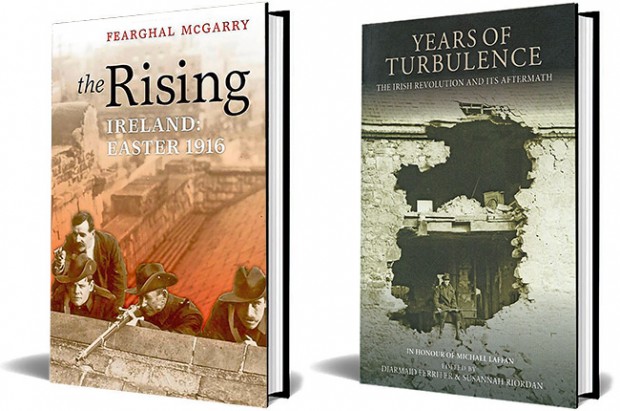1 August 2016 Edition
Revolution and revisionism
Book Reviews by Michael Mannion

The Rising – Ireland: Easter 1916
By Fearghal McGarry. Oxford University Press
THIS “Centenary Edition” is a rerelease of Dr McGarry’s excellent book, first published in 2010 but now with the addition of a new preface outlining the evolutionary processes that various commemorations have undergone over the past one hundred years.
The one constant element is the subordination of any commemoration to the particular political imperatives of successive government regimes.
The preface describes the Fine Gael/Labour Coalition’s disastrous 2016 video release “Ireland Inspires”, issued to outline the richness of the Government’s proposed commemoration. The video managed to completely omit any mention of the leaders of the Rising and focused instead on “such figures as W.B. Yeats, Queen Elizabeth II, Ian Paisley, Katie Taylor and Bob Geldof”. Even The Irish Times report was moved to lead with the wry headline: “Don’t mention the war”. The Government’s own Expert Advisory Group’s comment was rather more forthright: “Embarrassing, unhistorical shit”.
Although this book, with the exception of the new preface, has been in print for the last six years, it is really a very fine volume.
When this book was first published, in 2010, it was relatively groundbreaking in that it uses the testimonies collected by the Bureau of Military History in the 1940s and 1950s to illuminate the experience of the ‘rank and file’ who took part in the events of Easter Week 1916. The key condition attached to the bureau’s work was that the material it collected would not be released until all of those who had contributed testimonies were dead. Consequently, they were not released until 2003.
This volume, along with Charles Townshend’s Easter 1916: The Irish Rebellion constitute the two definitive books on Easter Week and either, or both, should have a place on everyone’s bookshelves.
Years of Turbulence: The Irish Revolution and its Aftermath
Edited by Diarmuid Ferriter and Susannah Riordan. UCD Press
THIS is essentially a collection of essays, each dealing with a unique aspect of Irish life, both of individuals and of specific societal groups, and of their relationship to the revolutionary struggle.
The entire volume is dedicated to Michael Laffan, Professor of History at UCD, and all the contributors are former students of his. Professor Laffan is widely regarded as one of the most influential figures in the “revisionist” school of history and the fact that the 12 essays are proceeded by a mini-hagiography of Professor Laffan is somewhat disquieting for readers of a republican, or even just nationalist, viewpoint.
Laffan has never been a friend of republicanism, and to mask antipathy as objectivity is disingenuous.
In a recent Irish Times article he defended the revisionist approach by writing:
“To an extent the state has acted to protect the image and legacy of the Easter Rising from being appropriated by extremists, some of who are – at best – recent converts to democracy.”
It is always worrying to see academics who regard their function as implementing state propaganda rather than research or education. They are quick to accuse others of a lack of objectivity whilst they themselves toe the party line in every pronouncement.
The 12 contributors to this volume, as favoured protégés of Professor Laffan, would be regarded as generally hostile to the republican tradition. But they are also superb scholars and their essays contain a wealth of original research illustrating many aspects of Irish society not previously considered, or at least not examined in detail.
Topics covered include the Suffragette movement; the 1915 All-Ireland Hurling Championship; Casement’s Irish Brigade; division within the Irish Parliamentary Party; images of Patrick Pearse after 1916; GHQ’s role in the Tan War; violence against women; executions of spies and informers; the Treaty and Civil War in County Galway; military service pensions and poverty; Bulmer Hobson; Seán Lemass. Quite an eclectic selection but all illustrating various elements of the tapestry of revolution being woven after 1916.
As republicans, it is important to not remain safely cocooned in one’s own world view but to examine contrary arguments, understand their motivation and to refute their contentions with logical and informed discussion. It’s something revisionism fails to do.



